Daily Vocabulary Words: Enhance Your Lexicon with Leading Newspapers & Publications
Welcome to the Daily Vocabulary section at Wordpandit!
Our mission is straightforward: to bring you essential vocabulary words featured in top newspapers and publications worldwide. By focusing on words you’ll encounter in renowned sources, we aim to help you enhance your vocabulary effectively and practically.
Our selection includes words from:
– The New York Times
– The Washington Post
– Scientific American
– BBC
– The Guardian
– Psychology Today
– Wall Street Journal
– The Economist
– The Hindu
– The Times of India
– The Economic Times
– Hindustan Times
– Live Mint
– The Indian Express
– And many more.
We are committed to your vocabulary development. Simply visit this section regularly and explore the daily posts. This is your go-to repository for commonly used words, providing significant practical benefits by familiarizing you with vocabulary from the leading publications listed above.
Make it a habit to visit our website daily and expand your lexicon with words from top newspapers and publications. (edited)
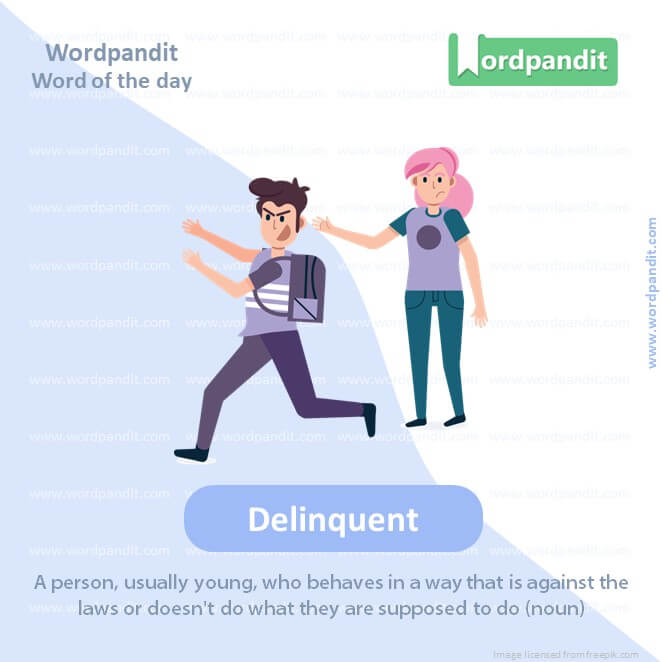
WORD-1: DELINQUENT
CONTEXT: There’s been widespread attention on Donald Trump’s asserting that he would refuse to defend NATO allies he considers “delinquent” and even saying he might encourage Russia to attack them.
SOURCE: The New York Times
EXPLANATORY PARAGRAPH: Imagine if you forget to clean up your toys after playing, even though you promised to. Being “delinquent” means not doing something you’re supposed to do, especially when it’s your responsibility.
MEANING: A person, usually young, who behaves in a way that is against the laws or doesn’t do what they are supposed to do (noun)
PRONUNCIATION: duh-LING-kwent
SYNONYMS: Neglectful, overdue, remiss, irresponsible, wayward, negligent, defaulter
USAGE EXAMPLES:
1. The library sent a reminder for the delinquent book.
2. He was labeled a delinquent for skipping school regularly.
3. Delinquent bills can lead to late fees.
4. The city is addressing delinquent taxes.
WORD-2: SELF-AGGRANDIZING
CONTEXT: My point, rather, is that he often seems unable to tell the difference between self-aggrandizing fantasies and things that actually happened.
SOURCE: The New York Times
EXPLANATORY PARAGRAPH: Imagine someone keeps saying how great they are all the time, even when others don’t agree. “Self-aggrandizing” means talking about yourself in a way that makes you seem more important or better than you really are.
MEANING: Promoting oneself as being powerful or important (adjective).
PRONUNCIATION: self-uh-GRAN-diz-ing
SYNONYMS: Boastful, bragging, self-promoting, self-important, conceited, egotistical, vainglorious
USAGE EXAMPLES:
1. His self-aggrandizing behavior annoyed his friends.
2. The speech was filled with self-aggrandizing statements.
3. She avoided self-aggrandizing to stay humble.
4. Self-aggrandizing comments often backfire in the long run.
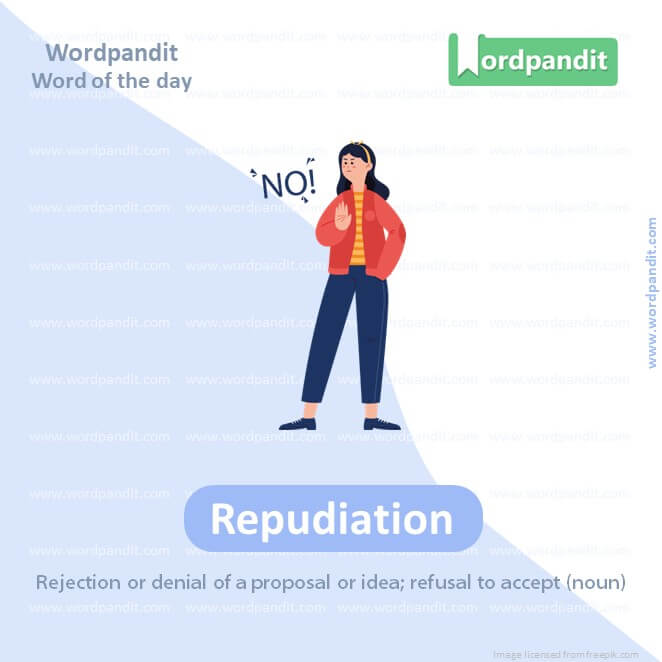
WORD-3: REPUDIATION
CONTEXT: Trump’s repudiation of NATO went down: He didn’t make a straightforward case, which would have been arguable, that we’re spending too much on defense while our allies are spending too little.
SOURCE: The New York Times
EXPLANATORY PARAGRAPH: Imagine you’re offered a yucky vegetable, and you say, “No, I don’t want that!” That’s like “repudiation,” which means saying no to something or refusing to accept it.
MEANING: Rejection or denial of a proposal or idea; refusal to accept (noun).
PRONUNCIATION: rih-pyoo-dee-AY-shun
SYNONYMS: Rejection, denial, disavowal, renunciation, refusal, abandonment, negation
USAGE EXAMPLES:
1. The company’s repudiation of the contract surprised everyone.
2. He faced repudiation from his community for his actions.
3. The politician’s repudiation of past statements was seen as insincere.
4. Her repudiation of the offer was firm and decisive.
WORD-4: CORROBORATING
CONTEXT: There’s almost never any corroborating evidence, and it’s a good bet that very few of these stories are accounts of actual conversations.
SOURCE: The New York Times
EXPLANATORY PARAGRAPH: Imagine you see a big dog in the park, and your friend sees it too. If your friend tells everyone about the big dog, they are “corroborating” your story. It means they are agreeing with you and helping to show that what you said is true.
MEANING: Providing evidence or support for something (verb).
PRONUNCIATION: kuh-ROB-uh-ray-ting
SYNONYMS: Confirming, supporting, validating, verifying, substantiating, authenticating, backing up
USAGE EXAMPLES:
1. The witness’s statement was corroborating the suspect’s alibi.
2. They found evidence corroborating the theory.
3. The report was corroborating our initial findings.
4. She provided documents corroborating her story.
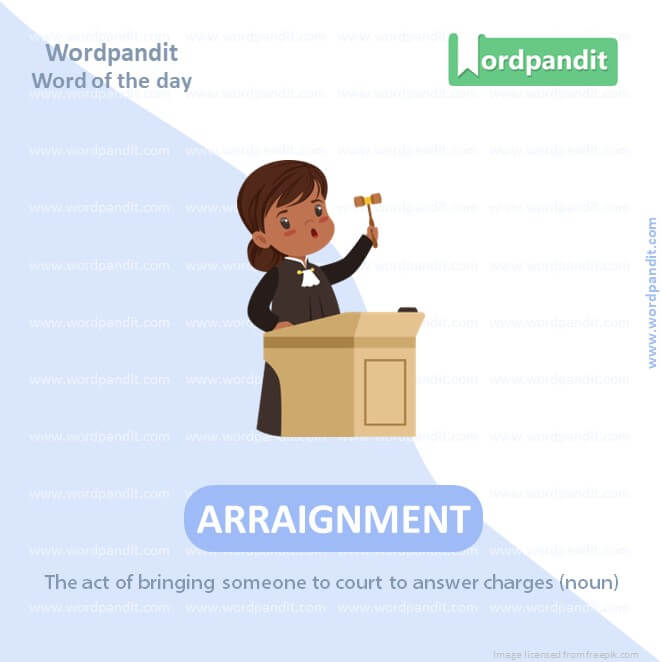
WORD-5: ARRAIGNMENT
CONTEXT: There’s no way that police officers and court employees were “crying” and apologizing to Trump at his Manhattan court arraignment last spring.
SOURCE: The New York Times
EXPLANATORY PARAGRAPH: Imagine someone did something wrong, like breaking a rule, and they have to go to a big room where people ask them about it. “Arraignment” is when a person is brought to court to hear the charges against them.
MEANING: The act of bringing someone to court to answer charges (noun).
PRONUNCIATION: uh-RAYN-muhnt
SYNONYMS: Indictment, accusation, prosecution, summons, charge, trial, hearing
USAGE EXAMPLES:
1. The arraignment of the suspect is scheduled for next week.
2. During the arraignment, the charges were read out loud.
3. The judge set the date for the arraignment.
4. The defendant appeared nervous during the arraignment.
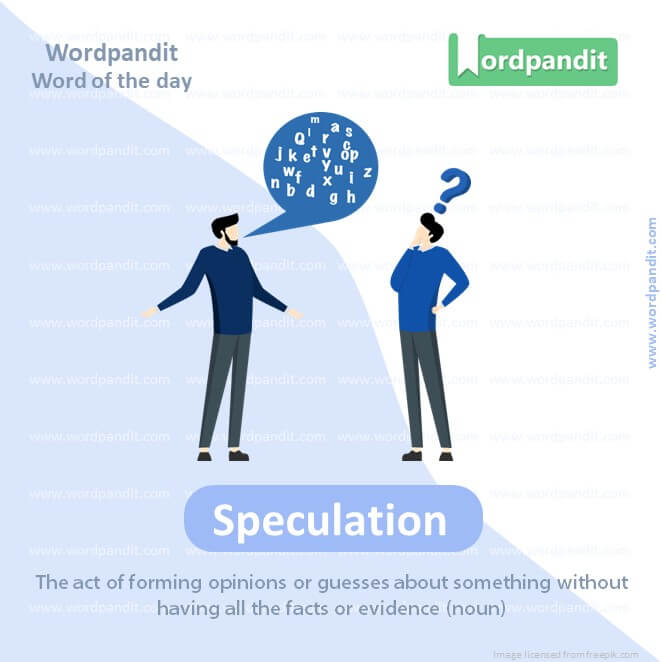
WORD-6: SPECULATION
CONTEXT: I haven’t seen many suggestions that he’s made bad decisions because his judgment is impaired; it’s almost all speculation about the future.
SOURCE: The New York Times
EXPLANATORY PARAGRAPH: Imagine you see dark clouds in the sky and think it might rain. That’s called “speculation,” which means guessing about what might happen in the future based on what you see or know.
MEANING: The forming of a theory or guess without firm evidence (noun)
PRONUNCIATION: spek-yoo-LAY-shun
SYNONYMS: Guessing, conjecture, theorizing, supposition, hypothesis, surmise, prediction
USAGE EXAMPLES:
1. There is a lot of speculation about the new movie.
2. His speculation about the outcome was interesting.
3. Speculation about the company’s future caused the stock price to drop.
4. They dismissed the rumors as mere speculation.
WORD-7: PIDDLING
CONTEXT: She’s piddled around hosting a conservative podcast.
SOURCE: The New York Times
EXPLANATORY PARAGRAPH: Imagine you’re supposed to clean your room, but instead, you spend time playing with a toy and not really getting much done. “Piddling” means wasting time and not doing anything important.
MEANING: Spending time in a trivial or ineffective way (verb).
PRONUNCIATION: PID-uhld
SYNONYMS: Dawdled, loitered, lingered, frittered, wasted, idled, procrastinated
USAGE EXAMPLES:
1. He piddled around the house all day instead of working.
2. They piddled away their time instead of studying.
3. Stop piddling and focus on your homework.
4. She piddled with her phone while waiting.
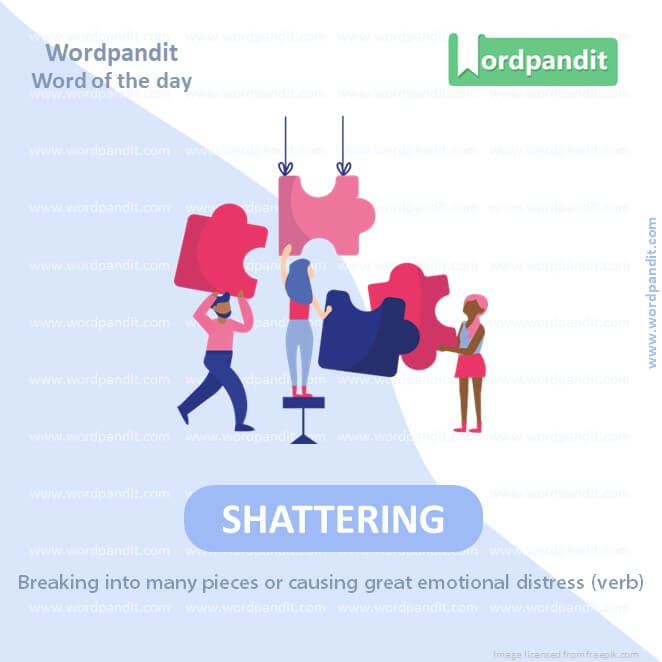
WORD-8: SHATTERING
CONTEXT: Mr. Trump isn’t shattering a norm so much as taking things to a disquieting extreme.
SOURCE: The New York Times
EXPLANATORY PARAGRAPH: Imagine dropping a glass, and it breaks into many tiny pieces. “Shattering” means something breaks into a lot of pieces or something happens that makes you very upset.
MEANING: Breaking into many pieces or causing great emotional distress (verb).
PRONUNCIATION: SHAT-er-ing
SYNONYMS: Smashing, breaking, crushing, devastating, destroying, splintering, fracturing
USAGE EXAMPLES:
1. The loud noise resulted in the shattering of the window.
2. The news was shattering for the entire community.
3. The vase fell, shattering into a thousand pieces.
4. Her dreams were shattering by the unexpected event.
WORD-9: EMBROILED
CONTEXT: This could be especially timely considering the legal mess in which the family company has been embroiled of late.
SOURCE: The New York Times
EXPLANATORY PARAGRAPH: Imagine two friends are arguing, and you get pulled into the argument even though you didn’t want to be. Being “embroiled” means getting involved in a difficult or messy situation.
MEANING: Involved deeply in a complicated situation (verb).
PRONUNCIATION: em-BROYL-d
SYNONYMS: Entangled, involved, ensnared, implicated, caught up, mired, mixed up
USAGE EXAMPLES:
1. He was embroiled in a scandal at work.
2. The country became embroiled in a lengthy war.
3. She was embroiled in a dispute with her neighbors.
4. The company got embroiled in a legal battle.
WORD-10: TANTALIZING
CONTEXT: “The Apprentice,” the Supreme Court could be an even more tantalizing option.
SOURCE: The New York Times
EXPLANATORY PARAGRAPH: Imagine seeing a delicious cake but not being able to eat it yet. “Tantalizing” means something looks really good and makes you want it very much, but you can’t have it right away.
MEANING: Exciting someone’s senses or desires (adjective).
PRONUNCIATION: TAN-tuh-lye-zing
SYNONYMS: Tempting, enticing, alluring, intriguing, captivating, inviting, teasing
USAGE EXAMPLES:
1. The smell of freshly baked cookies was tantalizing.
2. She received a tantalizing job offer.
3. The trailer gave a tantalizing glimpse of the upcoming movie.
4. His tantalizing words made her curious about the surprise.
Vocabulary Words with Meaning
Penetrating the rich tapestry of language, the essence of ‘vocabulary words with meaning’ is a crucial aspect. It’s these seeds of knowledge that bud into fluent conversations and comprehensive understanding. The knack of grasping ‘vocabulary words with meaning’ is pivotal in language learning, but it demands a nuanced approach and strategy.
Learning ‘vocabulary words with meaning’ isn’t about mechanically memorizing heaps of words. It’s about building connections and creating a profound understanding of these words. A promising approach to assimilate ‘vocabulary words with meaning’ involves utilizing a wide range of resources including literature, films, music, and digital content. This immersion provides a broad context and diverse settings for these words, simplifying their comprehension and use.
When you’re focusing on ‘vocabulary words with meaning’, remember to incorporate memory-enhancing techniques into your learning regimen. Tools like flashcards or recall-based applications can aid significantly in long-term retention of these words. Additionally, mnemonic strategies, associating words with distinctive images or stories enhance memory recall and understanding.
The journey of mastering ‘vocabulary words with meaning’ also benefits greatly from practice and application. Engage in conversations using the language, express your thoughts in writing, and try to incorporate newly learned words into your routine. This not only enhances your familiarity with the words but also aids in an intimate understanding of their connotations and denotations.
To sum up, learning ‘vocabulary words with meaning’ is akin to assembling a jigsaw puzzle: it requires patience, strategy, and persistence. But the picture that finally emerges is a beautiful tapestry of language – vivid, articulate, and expressive. So, set your sails toward the voyage of ‘vocabulary words with meaning’, and discover the joy of speaking and understanding a language with finesse.













